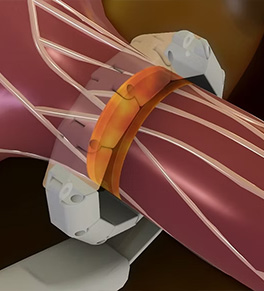
Urologic Cancer Care
At UCI Health, you’ll get the care and support you need from national leaders who specialize in advanced urologic cancer treatments.
Our approach to urologic cancer care
We know it can be overwhelming to get a cancer diagnosis. From your first consultation through the end of your treatment, we’re dedicated to delivering a compassionate patient experience.
What we do
Urologic cancers include tumors of the prostate, kidney, ureter, bladder, penis and testicles. Because your organ systems are unique, the different cancers also have distinct pathways.
Urologists treat any illness affecting the genitourinary system and oncologists are cancer doctors. That’s why our doctors are both urologists and oncologists, a necessary combination to properly diagnose and treat your condition. In addition, our clinicians have completed advanced residencies and coveted fellowships, ensuring mastery in their specialties.
We offer advanced treatment options
Our urologic oncologists are renowned for their pioneering expertise in robot-assisted, minimally invasive surgery. We use the da Vinci Surgical System® for prostate, kidney and bladder cancers. The robot's precise, remote-controlled arms enhance the surgeon's dexterity and control.
We also are national leaders in the use of cryoablation. This minimally invasive surgical procedure freezes kidney and prostate tumors. It doesn’t involve any incisions, lowers surgical risks and speeds your recovery time.
A team focused on you
There’s no one-size-fits-all way to treat urologic cancers, so we tailor treatments to your specific needs. To do that, we base our recommendations on your test results. As an integrated, multidisciplinary practice, we also consult with each other.
When you partner with us, you’ll have easy access to these specialists.
Your care team could include:
- Urologic oncologists – specialists who may work with you from diagnosis through surgery
- Interventional radiologists – for minimally invasive imaging
- Radiation oncologists – deliver radiation therapy
- Medical oncologists – prescribe chemotherapy medicines
- Nurse practitioners
- Physician’s assistants
Why choose UCI Health for urologic cancer care?
Nationally recognized urologic cancer care
At UCI Health, you have access to the urologic cancer treatments and services you need to thrive. This also includes access to urologic cancer clinical trials. If you qualify, clinical trials give you access to innovative treatments before they’re available to the public.
Leaders in the field
As the only academic medical center in Orange County, UCI Health is a National Cancer Institute-designated comprehensive cancer center. The NCI only gives this elite designation to 1.3% of cancer centers. We earned this status by demonstrating consistently excellent care, integrating cancer research into our treatments and serving the local community.
As a comprehensive center, you have access to clinicians who are leaders in improving urologic cancer care with the most advanced treatments. Our doctors are internationally respected academicians and researchers. Plus, studies show that quality of life and survival rates are better when you choose an academic medical center.
Pioneering cancer treatments
Our urologists are world-renowned for their leadership in minimally invasive surgery. These procedures help reduce your risk of incontinence and sexual dysfunction.
Robot-assisted surgery allows our surgeons to target the cancer more effectively. This means you recover faster and experience less discomfort. We’ve performed thousands of robot-assisted prostatectomies at UCI Medical Center.
We were the first medical center in Orange County to use the groundbreaking RapidArc® radiation therapy. It delivers a targeted X-ray beam that precisely conforms to the tumor shape. This helps reduce damage to healthy tissue and is faster than conventional radiotherapy.
Looking for more options?
View all clinicians
Urologic cancers don’t have to define your life
Early detection is important, especially when you have a family history. Our experts can help you at every stage of your healing journey.
Call 714-456-7005 to speak with one of our dedicated urologic oncologists.

Find a cancer clinical trial
Talk to your doctor to see if a cancer clinical trial is right for you.
Featured News Stories

UC Irvine receives its first ARPA-H award to advance lymphatic imaging, precision care

UC Irvine receives $12 million to test novel stem cell therapy for Huntington’s disease

Thousands take the Anti-Cancer Challenge, raising over $1 million for critical research
A record number of people joined the ninth annual Anti-Cancer Challenge to ride, run and walk to support cancer research.
Featured Blog Posts

Gastric cancer survivor credits novel clinical trial therapy

A living organ donor's lasting impact
A young man donates his kidney to save a stranger’s life.

First U.S. test of nerve-blocking device for resistant hypertension
Procedure zaps renal artery nerves linked to hypertension without damaging the blood vessel.




